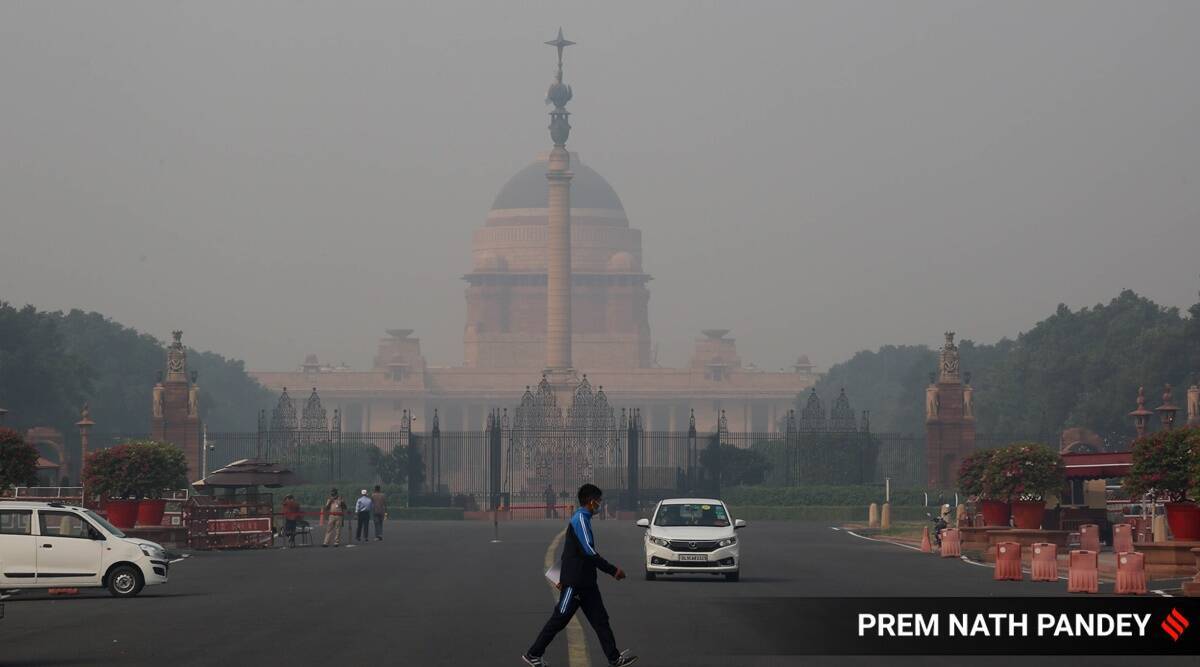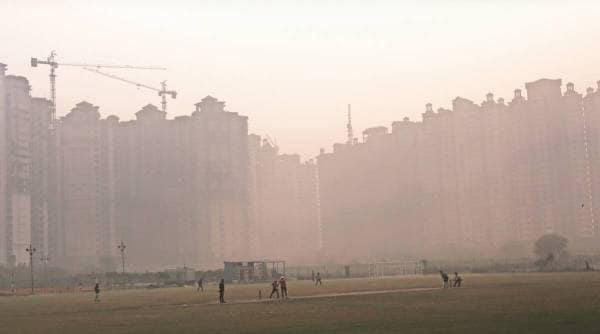 Noida recorded an AQI of 388 and Gurgaon 391. Delhi’s air quality remained the worst among the parts of the NCR that are being monitored by the CPCB. (Express Photo)
Noida recorded an AQI of 388 and Gurgaon 391. Delhi’s air quality remained the worst among the parts of the NCR that are being monitored by the CPCB. (Express Photo)Delhi Live Updates: Delhi’s air quality deteriorated once again to hit the ‘severe’ category Thursday morning with a 24-hour average AQI of 426 at 9 am. The worst air quality in the city was at Jahangirpuri and Anand Vihar where the monitoring stations recorded a 24-hour average AQI of 460, according to data from the Central Pollution Control Board (CPCB). The prominent pollutant at Jahangirpuri was PM2.5, while PM10 was found to be the most prominent pollutant at Anand Vihar.
As air quality worsened, measures to control the situation in Noida were discussed during a meeting of the Noida Authority and Greater Noida Industrial Development Authority (GNIDA) Wednesday. Officials of the Uttar Pradesh Pollution Control Board and the local administration also attended the meeting. The Air Quality Index (AQI) in Noida on Thursday morning was at 388, or the ‘very poor’ category, according to the Central Pollution Control Board (CPCB).
In other news, Delhi University has launched its new ‘Vice Chancellor Internship Scheme’ and has opened applications for it. A part of the programmes being introduced by the university in its centenary year, the scheme launched on Wednesday allows undergraduate and postgraduate students of the university to avail of paid internships at the university’s departments and centres.
 That the capital experienced its first good air day this year in September says a lot about the pollution levels that have been taken as par for the course by its residents. (Express Photo by Gajendra Yadav)
That the capital experienced its first good air day this year in September says a lot about the pollution levels that have been taken as par for the course by its residents. (Express Photo by Gajendra Yadav)

Bouncers outside a club in Gurgaon thrashed a forest department employee and his two friends Monday night and caused blunt injuries, said the police Thursday.
The police said the complainant, a range officer of the forest department, said he went to the club in a mall on the MG Road along with his friends and one of them forgot his phone in the club. He went inside to get it while others waited outside, according to the complainant.
“My friends and I were sitting on the third floor of the mall and talking amongst ourselves when an unknown person, claiming to be from the staff of a club, confronted us. He started arguing with us. Soon, some men, along with bouncers from another club, arrived and started beating and kicking us. My friends and I suffered injuries…the bouncers threatened to kill us,” he said in the first information report (FIR) registered at the Sector 29 police station. Read more.
Around 100 nurses from various Delhi government-run hospitals Wednesday morning began a “symbolic strike” to present their demands, including regularisation of service and long-due promotions. The Delhi Nurses Federation (DNF) said it would continue with the strike Thursday and Friday as well, from 9 am to 11 am.
The strike briefly affected hospitals where the workload of non-striking nurses went up. However, emergency and intensive care unit services did not suffer as nominal staff worked to render these two services, DNF secretary general Liladhar Ramchandani said.
Outpatient department (OPD) services and wards have been impacted due to the nursing staff strike, he said. “We apologise for the inconvenience and difficulty that patients will have to face during the strike,” he added. Read more.
Delhi’s air quality deteriorated once again to hit the ‘severe’ category Thursday morning with a 24-hour average AQI of 426 at 9 am. The worst air quality in the city was at Jahangirpuri and Anand Vihar where the monitoring stations recorded a 24-hour average AQI of 460, according to data from the Central Pollution Control Board (CPCB).
The prominent pollutant at Jahangirpuri was PM2.5, while PM10 was found to be the most prominent pollutant at Anand Vihar. Air Quality Index between 401 and 500 is considered to be ‘severe’. According to the CPCB, AQI in the ‘severe’ category “affects healthy people and seriously impacts those with existing diseases”. Read more.
As air quality worsened across Delhi and NCR, measures to control the situation in Noida were discussed during a meeting of the Noida Authority and Greater Noida Industrial Development Authority (GNIDA) Wednesday. Officials of the Uttar Pradesh Pollution Control Board and the local administration also attended the meeting.
The Air Quality Index (AQI) in Noida on Thursday morning was at 388, or the ‘very poor’ category, according to the Central Pollution Control Board (CPCB). Read more.